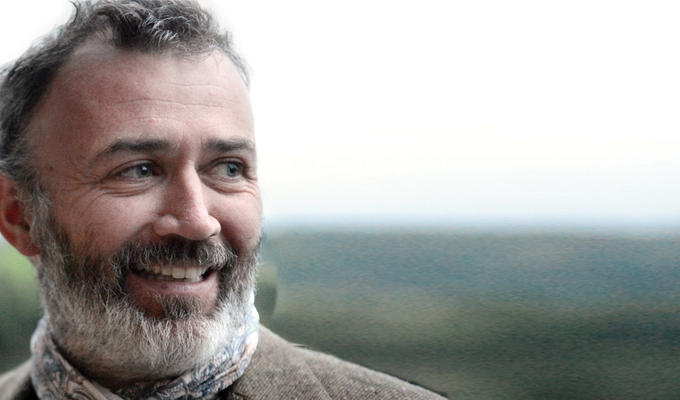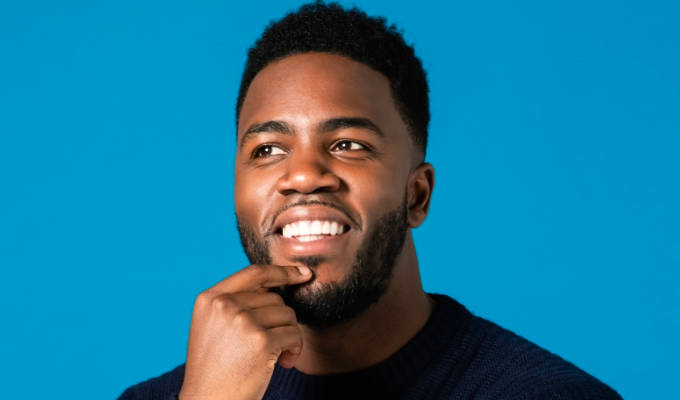
Cat Laughs, Kilkenny
Note: This review is from 2014
Festival round-up by Jay Richardson
For the opening night of its 20th anniversary year, the Cat Laughs festival herded more than 1,000 punters and almost as many comedians into the Hub at Cillín Hill, a Kilkenny venue that's normally a cattle market.
Curious smells notwithstanding, there was obvious goodwill from the organisers and comics towards the people and hostelries of this city for establishing this festival as the uniquely laid-back gathering of international talent it's become.
Warm words were delivered by founders Richard Cook and Michael McCarthy, the American returning with Cheers star George Wendt for the first time in nearly two decades alongside other graduates of Chicago's legendary Second City to deliver some improv.
With an Irish improv team led by Ian Coppinger and Brendan Dempsey, plus a UK contingent featuring the likes of Stephen Frost and Steve Steen also present at the festival, the gap between the Americans' supportive and organic story-building with that of the quicker, competitive, Whose Line Is It Anyway?-type games favoured on this side of the Atlantic, made for a compelling contrast. Neither better or worse, just different.
Sardonic co-hosts and festival mainstays Barry Murphy and Dom Irrera kept the mood from getting too celebratory. But unfortunately, so too did the usual gala temptation to try to cram too many acts into one show, a problem that regrettably extended to the festival as a whole.
Even after combining elements of the UK and Irish improv troupes, there just weren't enough shows for the three ensembles to get sufficient stage time, so they were jammed awkwardly into the big opening and closing bills of stand-ups.
Elsewhere at the festival, Des Bishop and Dashan performed gigs predominantly in Chinese to a largely Chinese audience, though there were occasional bursts of English for curious, non-Mandarin speakers and those who were self-confessedly drunk when they booked tickets.
The back room of Cleere's bar was full when I caught it, and while I admit that I only actually 'caught' about 10 per cent of it, the differences were again marked. Bishop, the established stand-up with all the recognisable mannerisms and stagecraft speaking carefully and deliberately, while Dashan, aka Canadian Mark Rowswell, the most famous Westerner in China and master of their Abbott and Costello-style crosstalk, linguistically more fluent but without the emphases and stage command of a seasoned stand-up. Nevertheless, it seemed to me as if most of those present were getting plenty out of the cultural exchange.
It was Bishop who had kicked off the opening night gig, introducing the year he spent in China by launching into his Mandarin version of House of Pain's Jump Around, a crash course that set the show running at a breakneck pace it couldn't sustain. Especially as the next act was Harland Williams, the Canadian's low-energy and surreal non-sequiturs never truly convincing the crowd and making for a Rotten introduction, a shame because he reportedly came over much better on subsequent nights.
Of the other North American acts, Mary Lynn Rajskub also struggled to connect with her low-key delivery and the fact that her role in the TV show 24 doesn't enjoy the same status in Kilkenny as it clearly does in the US. Still, there were some appealing confessions of dubious mothering in there and she increasingly came good as the festival wore on, permitting fewer routines to simply dissipate for want of a punchline.
Kilkenny veterans Kathleen Madigan and Lewis Black were considerably more at home, assured and unruffled in their sets despite exercising their middle-aged distemper. But the standout American was Jake Johannsen, who followed up an exasperated first performance about preserving the life of his daughter's hamster beyond financial common-sense, with routines that foregrounded his Everyman empathy on topics such as the anxieties of queuing and the conservatism of wife-swapping.
Elsewhere, W. Kamau Bell was enjoyably spiky and outspoken on gun crime, race and miscegenation, while Neal Brennan took on the challenge of flagging up the differences between men and women, bringing wit, verve and commitment to routines that could easily have come across as misogynistic in less accomplished, persuasive hands.
Predictably, the likes of Ardal O'Hanlon, Kevin Bridges, Dara O'Briain and Tommy Tiernan got huge receptions. The first three all more or less successfully hid their stand-up rustiness after not performing for a while, with O'Briain wringing delicious mischief out of Operation Yewtree and his own status at the BBC, before offering compelling glimpses of his forthcoming tour, mixing science observations with his position on lap dancing. Tiernan is in such a rich vein of poetic soulfulness at the moment - his routines pay backward compliment to the Irish diaspora and testimony to women throughout the land, distinguishing them by county as all manner of weird and wonderful, mythic creatures.
At the same time, I'd have liked to have seen more of Eleanor Tiernan after the first night but my schedule didn't permit. Frustrating, because with more understatement than her cousin, she plants similarly vivid images of the surreal in the commonplace, drawing the listener all the way into her relationship with her homeless, hypothetical Black Sheep of a son.
A significant recommendation for Kilkenny is that the audiences tend to vociferously acknowledge strong debuts. And Tiffany Stevenson and Katherine Ryan both went some way to Smashing it with sets that emphasised confident female sexuality and pilloried vapid celebrity culture, one celebrating Stevie Nicks, the other Beyoncé, affectionate but not wholly hagiographic set-pieces.
By contrast, seemingly, Ivo Graham reeled everyone in with his long-running lack of success with the ladies, in a set packed with self-deprecating topper gags, before revealing his recent erotic adventures. This belated shift in tone to playing high status is something he gleefully wrings maximum swagger out of, suggesting his imminent Edinburgh Fringe hour should be one to catch. Al Lubel meanwhile, offered something a little bit different to everyone else in the line-up, his signature routine on the pronunciation of his name (and stagename) and his tricky relationship with his overbearing mother offering the most formally playful stand-up I saw.
Standing apart too was the increasingly impressive Harriet Kemsley, whose affable oddness and occasional failure to convey the sharpness of her more twisted lines was unable to disguise her obvious potential. Greater conviction and consistency in this newcomer's persona and she'll emerge as a wonderfully distinctive act.
And she might well look to Gearóid Farrelly, who delivered my favourite set of the five days. The waspish Irishman has nailed his ruthlessly withering delivery since I last saw him, opening by disdainfully dismissing audience interaction and never looking back over a punchy 20 minutes that didn't contain a duff moment. An expressive storyteller who switches between victim and aggressor with a purse of the lips and devastating insult, he's emerged as a shrewd social commentator as well, deliciously expressing the subtextual horror of forced small talk, family Christmases and funeral interaction.
For the first time, alas, I couldn't make it to the annual football match, where Ireland triumphed over The Rest of the World 2-1 and Glenn Wool was hospitalised for a sprained ankle, subsequently arriving on stages with a crutch. Yet I was told by Kevin Bridges that the game was 'a bit of a bloodbath' as he expressed concerns about his hamstring for Sunday's Soccer Aid game at Old Trafford, the preening Glaswegian prima donna.
Review date: 3 Jun 2014
Reviewed by: Steve Bennett






